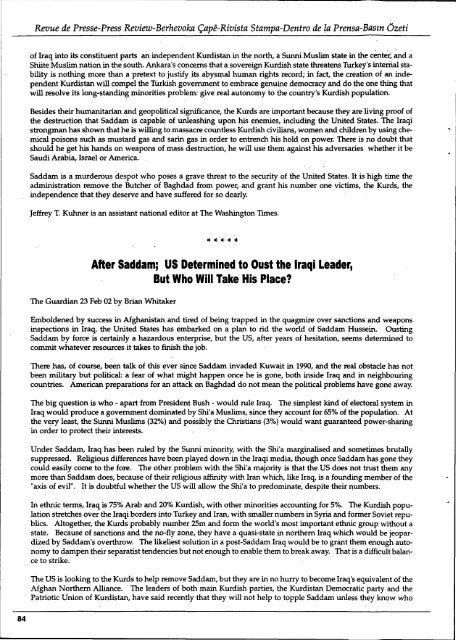Bulletin de liaison etd'information - Institut kurde de Paris
Bulletin de liaison etd'information - Institut kurde de Paris
Bulletin de liaison etd'information - Institut kurde de Paris
You also want an ePaper? Increase the reach of your titles
YUMPU automatically turns print PDFs into web optimized ePapers that Google loves.
Revue <strong>de</strong> Presse-Press Review-Berhevoka Çapê-Rivista Stampa-Dentro <strong>de</strong> la Prensa-Basm Özeti<br />
• . l ,<br />
of Iraq into its constituent parts an in<strong>de</strong>pen<strong>de</strong>nt Kurdistan in the north, a Sunni Muslim state in the center; and a<br />
Shiite Muslim nation in the sout.~. Ankara's concerns that a sovereign Kurdish state threatens Turkey's internal stability<br />
is nothing more t.l1ana pretext to justify its abysmal human rights record; in fact, the creation of an in<strong>de</strong>pen<strong>de</strong>nt<br />
Kurdistan will compel the Turkish government to embrace genuine <strong>de</strong>mocracy and do the one thing that<br />
will resolve its long-standing minorities problem: give real autonomy to the country's Kurdish population.<br />
Besi<strong>de</strong>s their humanitarian and geopolitical significance, the Kurds are important because they are living proof of<br />
the <strong>de</strong>struction that Saddam is capable of unleashing upon his enemies, including the United States. The Iraqi<br />
strongman has shown that he is willing to massacre countless Kurdish civilians, women and children by using chemical<br />
poisons such as mustard gas and sarin gas in or<strong>de</strong>r to entrench his hold on power. There is no doubt that<br />
should he get his hands on weapons of mass <strong>de</strong>struction, he will use them against his adversaries whether it be<br />
Saudi Arabia, Israel or America.<br />
. . . .<br />
Saddam is a mur<strong>de</strong>rous <strong>de</strong>spot who poses a grave threat to the security of the United States. It is high time the<br />
administration remove the Butcher of Baghdad from power, and grant his number one victims, the Kurds, the<br />
in<strong>de</strong>pen<strong>de</strong>nce that they <strong>de</strong>serve and have suffered for so <strong>de</strong>arly.<br />
Jeffrey T. Kuhner is an assistant national editor at The Washington<br />
Tunes.<br />
*****<br />
After Saddam; US Determined to Oust the Iraqi Lea<strong>de</strong>r,<br />
But Who Will Take His Place?<br />
The Guardian<br />
23 Feb 02 by Brian Whitaker<br />
Embol<strong>de</strong>ned by success in Afghanistan and tired of being trapped in the quagmire over sanctions and weapons<br />
inspections in Iraq, the United States has embarked on a plan to rid the world of Saddam Hussein. Ousting<br />
Saddam by force is certainly a hazardous enterprise, but the US, after years of hesitation, seems <strong>de</strong>termined to<br />
commit whatever resources it takes to finish the job.<br />
There has, of course, been talk of this ever since Saddam inva<strong>de</strong>d Kuwait in 1990, and the real obstacle has not<br />
been military but political: a fear of what might happen once he is gone, both insi<strong>de</strong> Iraq and in neighbC)uring<br />
countries. American preparations for an attack on Baghdad do not mean the political problems have gone away.<br />
The big question is who - apart from Presi<strong>de</strong>nt Bush - would rule Iraq. The simplest kind of electoral system in<br />
Iraq would produce a government dominated by Shi'a Muslims, since they account for 65% of the population. At<br />
the very least, the Sunni Muslims (32%) and possibly the Christians (3%) would want guaranteed power-sharing<br />
in or<strong>de</strong>r to protect their interests.<br />
Un<strong>de</strong>r Saddam, Iraq has been ruled by the Sunni minority, with the Shi'a marginalised and sometimes brutally<br />
suppressed. Religious differences have been played down in the Iraqi media, though once Saddam has gone they<br />
could easily come to the fore. The other problem with the Shi'a majority is that the US does not trust them any<br />
more than Saddam does, because of their religious affinity with Iran which,like Iraq, is a founding member of the<br />
"axis of evil". It is doubtful whether the US will allow the Shi'a to predominate, <strong>de</strong>spite their numbers.<br />
In ethnic terms, Iraq is 75% Arab and 20% Kurdish, with other minorities accounting for 5%. The Kurdish population<br />
stretches over the Iraqi bor<strong>de</strong>rs into Turkey and Iran, with smaller nuinbers in Syria and former Soviet republics.<br />
Altogether, the Kurds probably number 25m and form the world's most important ethnic group without a<br />
state. Because of sanctions and the no-fly zone, they have a quasi-state in northern Iraq which would be jeopardized<br />
by Saddam's overthrow. The likeliest solution in a post-Saddam Iraq would be to grant them enough autonomy<br />
to dampen their separatist ten<strong>de</strong>ncies but not enough to enable them to break away. That is a difficult balance<br />
to strike.<br />
The US is looking to the Kurds to help remove Saddam, but they are in no hurry to become Iraq's equivalent of the<br />
Afghan Northern Alliance. The lea<strong>de</strong>rs of both main Kurdish parties, the Kurdistan Democratic party and the<br />
Patriotic Union of Kurdistan, have said recently that they will not help to topple Saddam unless they know who<br />
84
















